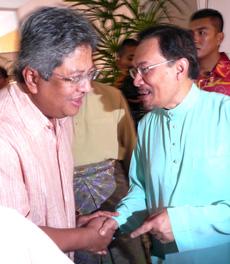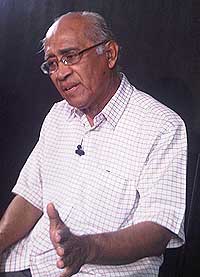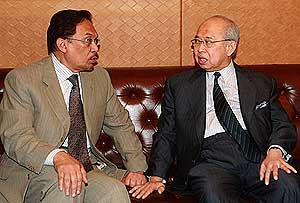COMMENT So long as he was the unofficial coordinator of the Common Policy Framework for Pakatan Rakyat, Zaid Ibrahim was seen to be doing well, so well in fact that when Hindraf’s P Waythamoorthy wanted his movement’s inputs in the CPF, he sought and obtained a meeting with Zaid in Singapore in November of 2009.
Waythamoorthy found Zaid an agreeable interlocutor who while firmly spurning Hindraf’s more unrealistic demands, gave its exiled champion the impression that Pakatan’s CPF would accommodate the Hindu rights body’s more legitimate concerns.
Waythamoorthy came away from the meeting with Zaid with the feeling that the latter was a more amenable interlocutor than Anwar Ibrahim towards whom Hindraf felt ambivalent.
 Hindraf viewed Anwar as brilliant at quickly leveraging on their show of force of November, 2007, but they discovered him to be indifferent in the follow-up. Worse, they saw Anwar as being devious in exploiting strains within the leadership of the movement, entertaining its more spurious elements that were agreeable to joining PKR while ignoring the movement’s more durable leaders.
Hindraf viewed Anwar as brilliant at quickly leveraging on their show of force of November, 2007, but they discovered him to be indifferent in the follow-up. Worse, they saw Anwar as being devious in exploiting strains within the leadership of the movement, entertaining its more spurious elements that were agreeable to joining PKR while ignoring the movement’s more durable leaders.
Zaid came away from the meeting with Waythamoorthy, confident that he, more than Anwar, had the pulse of the minorities in Malaysia. Earlier interactions with PKR leaders in Sabah and Sarawak sustained his perception his touch was surer on how to integrate minority aspirations in Pakatan’s agenda of national salvation of the Malaysian polity.
So long as Zaid hewed to the role of unofficial policy coordinator for Pakatan Rakyat, he was doing okay. But when factions within PKR, which by late 2009 were deeply distressed with Anwar, began regarding Zaid as an alternative leader, matters began to careen out of control.
Seeds of discontentment
Fluid perceptions of power and fear, renowned Greek historian Thucydides observed, are the classic causes of war. In a political party, these are the ingredients of internecine conflict.
By late 2009, it became evident that long-serving PKR deputy president Dr Syed Husin Ali was in recessional as age, illness in the family, and the pull of memoir writing began to impose their introspective constraints.
Syed Husin, 74, was going to retire and PKR would no longer have a buffer between their Mandela-like supremo and the motley crew that composed its third-tier of leadership. Syed Husin not only ignored entreaties he stay on to avoid a damaging battle for the No 2 position; he underestimated the propensity for disorder in the party.
Left-of-centre ideologues are apt to underrate the human will to evil. They think problems in society stem from a lack of education and awareness. Multiply the stock of knowledge and narrow the income gap between the top tier and the bottom half and what have you – a social democratic nirvana.
 Accordingly, Syed Husin and the former Parti Rakyat Malaysia cohort in PKR began to urge Anwar to go for direct elections to all posts in PKR in the upcoming party elections, if only to demonstrate the superiority of the PKR way to a people’s democracy, in contradistinction to the corruption-ridden methods by which depised rival Umno elects its leaders.
Accordingly, Syed Husin and the former Parti Rakyat Malaysia cohort in PKR began to urge Anwar to go for direct elections to all posts in PKR in the upcoming party elections, if only to demonstrate the superiority of the PKR way to a people’s democracy, in contradistinction to the corruption-ridden methods by which depised rival Umno elects its leaders.
Anwar is no ideologue of the left or right; he is too pragmatic a politician to mistake abstractions for reality. He looks to what will motor the rakyat to take them from one point to the next, without a particular bias for any ideological strain. Though excited by the world of ideas, he is not particularly attached to any, judging each by their efficacy and utility to the goals he has in mind.
In early 2010, weighed down by a second round of the sodomy charges he faced in 1998-99, and seeing the way his legal defence had had all their preliminary objections to his looming trial struck down, Anwar began to prepare for the eventuality of his jailing.
This entailed the renewal of exploratory chats with Tengku Razaleigh Hamzah, then Umno’s most famous dissident and PM-in-perennial-waiting.
Ku Li as interim PM
In the immediate aftermath of the tsunami of March 2008, Anwar had spoken to Razaleigh about leading a rump from Umno to form a Pakatan-plus plurality in Parliament that would govern, with Ku Li as interim prime minister, until another general election is held to stabilise what would then be a decisive Pakatan majority, this time with Anwar as head honcho.
The Anwar-Ku Li chats dribbled into futility, mainly on account of Ku Li’s tendency to up his side of the bargain whenever Anwar approached with a slightly revised proffer than he had previously.
 Needless to say, the negotiations were rendered moot by Ku Li’s burgeoning hopes that the upcoming Umno party elections would spurn tsunami-devastated president Abdullah Ahmad Badawi, set aside heir apparent Najib Razak as too problematic, and turn, at long last, to the Kelantan prince for grand rectification of the years when Umno had lost its way, simply from preferring a Mahathir to a Razaleigh.
Needless to say, the negotiations were rendered moot by Ku Li’s burgeoning hopes that the upcoming Umno party elections would spurn tsunami-devastated president Abdullah Ahmad Badawi, set aside heir apparent Najib Razak as too problematic, and turn, at long last, to the Kelantan prince for grand rectification of the years when Umno had lost its way, simply from preferring a Mahathir to a Razaleigh.
Even when those hopes evaporated in the ignominy of a single nomination from his constituency of Gua Musang for the Umno presidency in the party elections of March of 2009, Ku Li did not lose hope.
He and his supporters waited with bated breath as Najib, unopposed for president in the party polls, shaped to replace Abdullah in early April of 2009.
A brief delay between Abdullah’s resignation and Najib’s swearing-in caused a flurry of speculation that Ku Li could be summoned to form a government. The rulers’ conference of the previous month had given him hope that he could be summoned because he was asked to stand by to provide an overview of the political situation.
In the event, the briefing did not take pace but the hiatus between Abdullah’s resignation and Najib’s swearing-in once again spurred hopes that the summons would come. It did not.
But the unquenchably optimistic Ku Li was undeterred.
Though he is too much the gentleman to take his pleasure in others’ discomfiture, he knew that Anwar’s legal problems would soon provide another shot at the top prize.
Renew talks
So when Anwar early this year, in anticipation of a jailing over the sodomy issue, began to chat with Ku Li once again on the matter of his leading a rump from Umno to combine with Pakatan MPs to form a slight plurality in Parliament, Ku Li was amenable.
He knew that the general public viewed Anwar’s legal difficulties as a grotesque rerun of 1998-99. Anwar’s jailing would be considered intolerable, leading to a minor revolt in the Umno backbench and an eventual conjoining of parliamentary forces to unseat Umno-BN, with improvised leader Ku Li showing the king that he enjoyed the confidence of a majority.
This would lead to new elections with Ku Li as leader of a Pakatan-plus government while Anwar sorted out his legal predicament.
The bargaining over the details of this hypothetical scenario hit a snag when Ku Li demanded that Anwar allow him to choose 30 candidates for seats allocated to Ku Li’s faction in the snap polls that Ku Li would call after posting a parliamentary majority and electing to dissolve the house.
The PKR supremo was only willing to concede 10.
Once in the amiable bantering and haggling over this issue, Ku Li, on the phone with Anwar, casually let on that “five of your boys are here”, meaning five PKR MPs were at that very moment talking to the Gua Musang MP while their leader was on the line with the man they were visiting.
It is not certain whether that was the critical moment when Anwar Ibrahim yielded to Syed Husin’s argument that direct elections be allowed for all top posts in PKR. But it is plausible that at that moment he felt he needed a loyalist in the No 2 post if he went to jail, the better to forestall a scuttling of the party by uncertain MPs when the chief pilot is gaoled.
From that time on a contest for the deputy president’s post between loyalist Azmin Ali and dissident Zaid became inevitable – with all the damaging effects that that battle has had on PKR’s image and preparations for a fast approaching general election.
THE UNMAKING OF ZAID - Part 1 l Part 2 l Part 3
TERENCE NETTO has been a journalist for close on four decades. He likes the occupation because it puts him in contact with the eminent without being under the necessity to admire them. It is the ideal occupation for a temperament that finds power fascinating and its exercise abhorrent.

